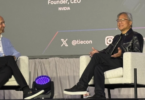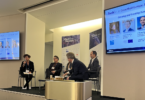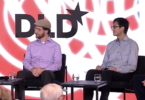Over 150,000 people gathered in Paris June 14-17 for the annual Viva Technology conference. While U.S. tech rock stars like Tesla and SpaceX founder and CEO Elon Musk, Salesforce’s Marc Benioff, Former Cisco Executive Chairman John Chambers and Cloudflare Co-founder and CEO Matthew Prince drew huge crowds, part of the conference’s raison d’etre is to showcase France’s and Europe’s technology prowess.
The Innovator’s Editor-in-Chief moderated three sessions at Viva Tech, including one with Prince (see the photo) on threats to the Internet and two on AI.
During the conference French President Emmanuel Macron announced that France would set aside an extra € 500 million, on top of the €1.5 billion already allocated, to help make the country a leader in artificial intelligence. He was joined on stage by the CEO of Mistral, a young startup that has the ambition to challenge Microsoft-based OpenAI and Google’s Bard. Macron promised an additional $500 million in investment int AI, on top of the 1.5 billion pledged earlier. “In the field of artificial intelligence, I want France to be the champion and position itself at the forefront of this new industrial revolution,” Macron tweeted – in French – ahead of the visit.
Software République, a consortium that includes car maker Renault, some of France’s other traditional industries and startups, chose Viva Technology to introduce a concept car called H1st Vision. The H1st Vision( which stands for Human First Vision) was designed to help the country’s auto industry remain competitive with newcomers like Tesla. The French concept car integrates more than 20 innovative technologies, from an all-new secure biometric access control system to predictive hazard alerts, optimized range and recharging, continuous monitoring of driver and vehicle health and an audio system designed with French composer and performer Jean-Michel Jarre. The consortium plans to launch 10 new services and products, incubate 50 or more startups and offer services in at least 50 locations worldwide by 2025.
Here are some of the key takeaways from the conference:
*AI regulations: Just one and a half hours after the European Parliament passed a draft law known as the AI Act, which would put new restrictions on what are seen as the technology’s riskier applications, two of the world’s top experts on AI governance – Kay Firth-Butterfield and Sacha Alanoca -spoke on a panel moderated by The Innovator’s Editor-in-Chief about AI ethics and liability on day one of Vivatech. While Macron and some entrepreneurs at the conference expressed concern about EU AI regulations impeding innovation panel members begged to differ. Alanoca said there is a false dichotomy between regulation and innovation. Some regulation is required, she said. The EU AI Act, a proposed European law on artificial intelligence (AI) – the first law on AI by a major regulator anywhere – is expected to be passed by the end of this year. The law assigns applications of AI to three risk categories. First, applications and systems that create an unacceptable risk, such as government-run social scoring of the type used in China, are banned. Second, high-risk applications, such as a CV-scanning tool that ranks job applicants, are subject to specific legal requirements. Lastly, applications not explicitly banned or listed as high-risk are largely left unregulated. Having a risk-based approach is a good way forward because it acknowledges that we don’t need to have the same level of scrutiny for all types of AI, she said. At the same existing laws can and should be applied to issues such as copyright, said Firth-Butterfield.
* AI risks: AI risks were highlighted in a presentation on a new report from McKinsey (see the separate Q & A with Eric Hazan). They include algorithms that reflect historical bias; training data and model outputs that infringe on copyrighted, trademarked, patented or otherwise legally protected materials; models that hallucinate or produce different answers to the same prompts, impeding the users’ ability to assess the accuracy and reliability of outputs; and finally Generative AI models could significantly impact the workforce and/or lead to detrimental impact on society if not used with care. But the presentation also stressed that there is a huge upside to using Generative AI.
*AI and productivity: McKinsey’s latest research estimates that generative AI could add the equivalent of $2.6 trillion to $4.4 trillion across 63 use cases. About 75% of the value that Generative AI use cases could deliver falls across four areas: Customer operations, marketing and sales, software engineering and R&D. To leverage the technology’s upside while managing risk corporates will need to integrate the concept of technology social responsibility in their digital and data strategies and upskill their workforce.
*Reskilling was a key part of the conversation during a panel on how to prepare for AI ubiquity. People will not be replaced by AI, said panelist Francoise Soulie, They will be replaced by people who know how to use AI. Everyone needs to learn how to apply AI, she said. Soulié has over 40 years’ experience working with neural networks, machine learning, social network analysis and Big Data in academia and in industry. She is a co-founder of Hub France Intelligence Artificielle, a French organization that aims — through a bottom- up approach — to help create an AI industrial sector in France and Europe She noted the work the organization has done with the country’s SMEs and said that even those that started out by knowing nothing about AI are now using the technology to advance their businesses.
*Trust in technology was another big theme at the conference. On a panel about threats to the Internet Nadav Zafrir, founder of Israeli venture firm Team8 said he thinks three things are undermining trust in The Internet: Generative AI is exasperating fake news and extremism. As a result the only trusted information risks to be behind paywalls, creating information haves and have nots; quantum computing will spell the end of encryption, threatening e-commerce; and the energy consumption of data centers – already gobbling up 10% of the world’s energy – are set to dramatically increase at a time when the world is trying to deal with the climate crisis. Zafrir told people in the audience that there are three ways that they could help restore trust by developing AI that can be used to verify information, privacy-enhancing technologies and distributed computing solutions based on renewables. Prince, who was on the same panel, said he worries about fragmentation of the Internet.
*Green revolution was an important topic, so it is no surprise that Manage Your Wardrobe, a London-based startup that has developed a tech-enabled clothing care and repair platform, won the 2023 LVMH Innovation Award, during a ceremony that recognized seven startups. Following the jury’s deliberations, Bernard Arnault presented the Grand Prize.
*Surviving and thriving in a downturn: Former Cisco Executive Chairman John Chambers gave his top tips on how to thrive during a downturn to a packed room of entrepreneurs. (See the column Chambers wrote for The Innovator on the same topic.)
*Collaboration with startups – Many of France’s traditional industries – such as Engie,and L’Oreal – hosted startups on their stands, underscoring their recognition that doing so is necessary if they want to remain competitive. The Software République an open innovation ecosystem created by six major companies – Atos, Dassault Systèmes, Orange, Renault Group, STMicroelectronics and Thales – to help develop a European ecosystem for sustainable, sovereign and safe mobility, is a case in point. To develop the concept car presented at VivaTech, it called on the expertise of six start-ups – Arkamys, Compredict, Epicnpoc, Eyelights, Kardome and Stern Tech – as well as JC Decaux and its founding members. It only took six months – which is record time for a project involving around 100 people for the group to develop the concept car – members of the group said on stage at Vivatech.
*Mobility was also a key theme at VivaTech. In addition to the H1st Vision concept car innovations from startups focused on moving people and goods on roads, water, and in the air in the near future included “air scooters” and tiny electric cars with removable batteries.
*Sports tech had its own hall, a nod to the fact that Paris will host the 2024 Olympic games.
This article is content that would normally only be available to subscribers. Sign up for a four-week free trial to see what you have been missing.







